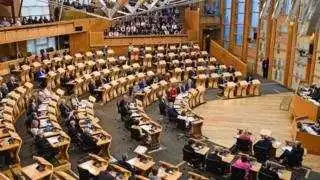 Image copyright Getty Images
Image copyright Getty Images
Nicola Sturgeon will open the new Holyrood term with a speech setting out her government's plans
First Minster Nicola Sturgeon is to set out her plans for the coming year as MSPs return to Holyrood after recess.
Ms Sturgeon will open the new year at the Scottish Parliament with a speech detailing her programme for government.
She will announce a dozen new pieces of legislation, with focus expected to be on mental health, the environment and sustainable growth in the economy.
MSPs will spend the rest of the week debating the plans, with other parties also setting out their own priorities.
Members are returning from the summer recess with 13 bills from the previous term still to work on, as well as continuing debate over Brexit and Scottish independence.
Ms Sturgeon's speech will include "major announcements" on health, the economy and social security, with the first minister saying there was "much more we want to do".
It is expected there will be a focus on low-carbon growth, extra funding for mental health services and detailed plans for new welfare powers devolved to Holyrood.
The first minister said the programme would include "the most ambitious long-term level of infrastructure spend that Scotland has ever seen", with investment in schools, hospital, transport, digital connectivity and clean energy.
She added: "This programme for government continues the major reforms that are under way in our health, education and justice systems. And it builds on the progress we have made in tackling inequalities.
"Of course we cannot ignore the fact that Brexit puts all of our progress at risk, with uncertainty being made worse by the Tories' blundering and the prospect of a no-deal outcome.
"But equally, we must not let Brexit define us, curtail our ambitions or halt Scotland's progress."
'Shape up and deliver'
Opposition MSPs will have a chance to put forward their priorities, with debates on the programme for government scheduled for Tuesday, Wednesday and Thursday.
The Scottish Conservatives said Ms Sturgeon was "getting her excuses in early" by blaming Brexit for "all her government's inevitable failings".
MSP Jackson Carlawwho will fill in for leader Ruth Davidson when she goes on maternity leave later this yearsaid the government was "tired" and failing to follow through on previous plans.
He said: "The star of the show last year was going to be a bill on education, which just before recess the government abandoned.
"This session of parliament marks the point where we go into the countdown towards the next Scottish elections. Either this government starts to shape up and deliver, or it has to make way for people who can."
Jackson Carlaw said Nicola Sturgeon was "getting her excuses in early"
Scottish Labour set out a list of areas where it wanted to see "real change" ahead of the speech, including greater investment in the teaching and NHS workforces, a "radical anti-austerity budget that makes the richest pay their fair share", and public ownership of public transport.
Leader Richard Leonard said: "The SNP is not standing up for Scotland when it cuts teacher numbers, oversees soaring waiting times and sits on its hands rather than tackle our housing crisis and broken economy.
"Labour will lead the fight for the real change the people of Scotland need and want, offering an end to cuts and austerity to ensure society and the economy work for the many, not the few."
'Big moves'
The Scottish Greens have challenged Ms Sturgeon to be "bolder" in government, calling for more investment in new teachers, reforms to council tax and improvements for public transport.
Co-convener Patrick Harvie said the government was "starting to lose its way", saying it was his party which was "bringing forward the fresh, bold ideas to keep our parliament moving forward".
The Scottish Lib Dems said the SNP was "out of ideas" and "tired", with constitutional issues like Brexit and independence "massive distractions from the domestic issues that really matter".
Leader Willie Rennie called for "big moves" to improve teacher recruitment, the scrapping of national assessments for P1 pupils, and a "seismic shift in mental health service delivery".